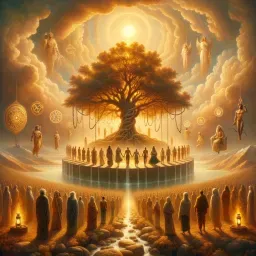Vanity of vanities, all is vanity

0
0
0
0
- Meaning
- The phrase "Vanity of vanities, all is vanity" speaks to the transient and fleeting nature of worldly pursuits and achievements. It suggests that many human endeavors, especially those driven by selfish desires and pride, ultimately lead to emptiness and lack meaning. The term "vanity" here doesn't refer to mere self-admiration but implies futility and purposelessness.
- Allegory
- The image of a grand, ancient city in ruins reflects the transient nature of human efforts and accomplishments, embodying the phrase's core message about vanity and futility. The broken statues represent pride and ego now fallen into disarray. The reflective pool shows the contemplative nature of humanity, questioning the purpose and meaning of life. The vast skies with swirling clouds symbolize the ephemeral nature of existence, while the trees growing among the ruins offer a glimmer of hope, suggesting that even amid futility, there is potential for growth and renewal. These elements combine to provide a visual narrative that captivates and stimulates reflection on the timeless wisdom of the phrase.
- Applicability
- This phrase can be applied to encourage people to seek deeper meaning and purpose in life beyond superficial or materialistic goals. It can be a reminder to focus on lasting values like love, wisdom, and spirituality rather than temporary gains.
- Impact
- The impact of this phrase on culture has been profound. It has influenced Christian and Jewish theological thought, as well as secular philosophy. It has prompted countless discussions about the purpose of life and the nature of human endeavor. In literature, it has been referenced by authors such as Herman Melville and Miguel de Cervantes to emphasize themes of existential contemplation and societal critique.
- Historical Context
- The Book of Ecclesiastes is believed to have been written during the Hellenistic Period, roughly between the 3rd and 2nd centuries BCE. This was a time of significant philosophical and cultural reflection, as Jewish society was encountering and interacting with Greek culture and ideas.
- Criticisms
- Criticisms and controversies surrounding this phrase often stem from its perceived pessimism. Some argue that it presents a bleak view of life, potentially leading to nihilism. Others contend that the phrase challenges individuals to find meaning in a seemingly meaningless world, prompting a deeper exploration of personal values and beliefs.
- Variations
- Variations of this sentiment can be found in different cultures. For instance, in Buddhist philosophy, the idea that worldly desires lead to suffering and are ultimately empty echoes the essence of "vanity." Across cultures, there is an understanding that transient desires and ambitions might not lead to lasting fulfillment or happiness.
-

The best way to predict the future is to create it.
-

In times of peace, prepare for war.
-

Know thyself.
-

The only true wisdom is in knowing you know nothing.
-

The truth shall set you free.
-

Happiness is not something ready-made. It comes from your own actions.
-

Man is condemned to be free; because once thrown into the world, he is responsible for everything he does.
-

We are our choices.
-

Nemo propheta in patria.
No Comments